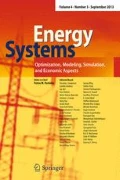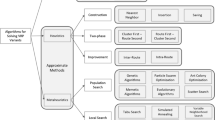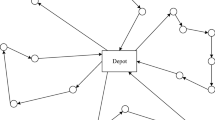Abstract
The current paper discusses the problem of the synchronization of public transit services through the rescheduling of their initial execution times. The objective of the analysis is the minimization of waiting time that occurs for passengers when they embark on journeys through a co-modal or a unimodal public transport network. Fundamental concepts of public transport and co-modality are discussed, and particular focus is given to the development of approaches that are practical and can be applied to the whole network and not just to some parts of it. Three instances of the problem of rescheduling are presented and further analyzed, and corresponding mixed integer-linear programming models are developed for their solution. The mathematical models aim to be flexible and applicable to a broad set of available datasets that have been homogenized according to the general transit feed specification. Parameters are used in the approaches in order to define the degree to which we want to change the existing way that services operate. Case studies are presented for Greek, Czech, and Slovak public transport networks, in which reductions from 1 to 20% in the overall waiting time of passengers are obtained.







Similar content being viewed by others
Change history
30 July 2020
In the original version of this article, unfortunately series of errors have been introduced during the publication process that compromise the readability of the article to considerate degree. The errors refer to presentation issues and not issues that challenge the scientific evidence provided within the article.
References
TNS Political & Social.: “Europeans’ satisfaction with urban transport”, European Commission (2014).
Bussieck, M.R., Winter, T., Zimmerman, U.T.: Discrete optimization in public rail transport. Artic. Math. Program. 79(1), 415–444 (1997)
Goverde, R.: Synchronization control of scheduled train services to minimize passenger waiting time. In: Proceedings of the 4th TRAIL Congress-Transport Infrastructure and Logistics (1998)
Ceder, A., Golany, B., Tal, O.: Creating bus timetables with maximal synchronization. Transp. Res. 35, 913–928 (2001)
Erranki, A.: A model to create bus timetables to attain maximum synchronization considering waiting times at transfer stops. University of Florida Scholar Commons, Tallahassee (2004)
Ibarra-Rojas, O.J., Rios-Solis, Y.A.: Synchronization of bus timetabling. Transport. Res. Part B Methodol. 46(5), 599–614 (2012)
Saharidis, G., Dimitropoulos, C., Skordilis, E.: MInimizing waiting time at transitional nodes for public bus transportation in Greece. Oper. Res. Int. J. 14(3), 341–359 (2013)
Dessouky, M., Hall, R., Zhang, L., Singh, A.: Real-time control of buses for schedule coordination at a terminal. Transport. Res. Part A Policy Pract. 37(2), 145–164 (2003)
Gkiotsalitis, K., Maslekar, N.: Improving bus service reliability with stochastic optimization. In: IEEE 18th International Conference on Intelligent Transportation Systems, Las Palmas, pp. 2794–2799. https://doi.org/10.1109/ITSC.2015.449
Gkiotsalitis, K., Maslekar, N.: Towards transfer synchronization of regularity-based bus operations with sequential hill-climbing. Public Trans. 10, 335–361 (2018)
Barrena, E., Canca, D., Coelho, L.C., Laporte, G.: Single-line rail rapid transit timetabling under dynamic passenger demand. Transp. Res. Part B 70, 134–150 (2014)
Barrena, E., Canca, D., Coelho, L.C., Laporte, G.: Exact formulations and algorithm for the train timetabling problem with dynamic demand. Comput. Oper. Res. 44, 66–74 (2014)
Zegordi, S.H., Hassannayebi, E.: Variable and adaptive neighbourhood search algorithms for rail rapid transit timetabling problem. Comput. Oper. Res. 78, 439–453 (2017)
Dessouky, M., Lu, Q., Hall, R.: Optimal holding times at transfer stations. Comput Ind Eng 40(4), 379–397 (2001)
Clausen, T., Pisinger, D., Reinhardt, L.B.: Synchronized dial-a-ride transportation of disabled passengers at airports. Eur. J. Oper. Res. 225(1), 106–117 (2013)
Jin, J.G., Lee, D.H., Axhausen, K.W., Sun, L.: Demand-driven timetable design for metro services. Transport. Res. Part C Emerg. Technol. 46, 284–299 (2014)
Wong, R.C.W., Yuen, T.W.Y., Fung, K.W., Leung, J.M.Y.: Optimizing timetable synchronization for rail mass transit. Transport. Sci. 42(1), 57–69 (2008)
Attiko Metro Website: https://www.ametro.gr/. Accessed 15 June 2020
Acknowledgements
This research is ongoing with the contribution of the LIFE programme of the European Union—LIFE14ENV/GR/000611 (GreenYourMove-GYM). GreenYourMove is a European Research Project co-funded by LIFE, the EU financial instrument for the environment. GreenYourMove’s main objective is the development and promotion of a co-modal journey application to minimize GHG emission in Europe. GreenYourMove develops a multi-modal transport planner (both routing & ticketing system) considering all kinds of urban public transportation (urban and sub-urban buses, metro, tram, trolley, trains), where the user gets alternative routes combining more than one transport modes if necessary. The routes are the environmentally friendliest ones, since emissions are calculated for different scenarios.
Author information
Authors and Affiliations
Corresponding author
Additional information
Publisher's Note
Springer Nature remains neutral with regard to jurisdictional claims in published maps and institutional affiliations.
“The original version of this article was revised:” Unfortunately series of errors have been introduced during the publication process that compromise the readability of the article to considerate degree. The errors refer to presentation issues and not issues that challenge the scientifc evidence provided within the article.
Rights and permissions
About this article
Cite this article
Rizopoulos, D., Saharidis, G.K.D. Generic approaches for the rescheduling of public transport services. Energy Syst (2020). https://doi.org/10.1007/s12667-020-00393-w
Received:
Accepted:
Published:
DOI: https://doi.org/10.1007/s12667-020-00393-w




